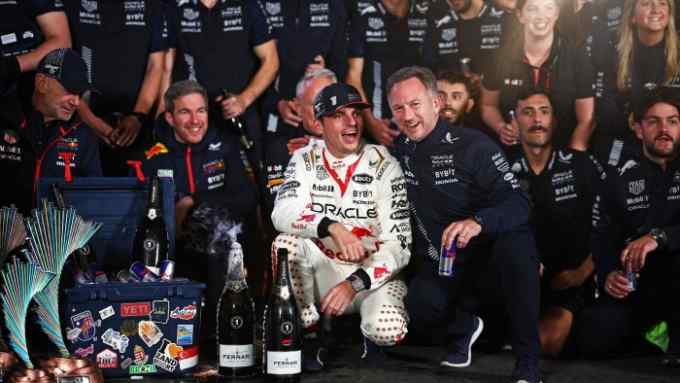Liberty Media pulls off its F1 Las Vegas bet

Roula Khalaf, Editor of the FT, selects her favourite stories in this weekly newsletter.
Not even Red Bull’s Max Verstappen could stay angry at Las Vegas for too long. As the three-time Formula One world champion crossed the finish line, he sang along to “Viva, Las Vegas” as the song played on his car radio.
Wearing an Elvis Presley-inspired race suit, Verstappen’s victory in the first F1 Grand Prix in Vegas for four decades ensured that the sport’s street-race on the strip ended on a high.
Just days before his record-extending 18th win of the season, the Dutchman had complained that the spectacle in Nevada was “99 per cent show, 1 per cent sporting event”.
Verstappen’s criticism of the event raised questions about the sport’s expansion under the ownership of telecoms billionaire John Malone’s Liberty Media, which has controlled F1 since an $8bn deal in 2017.
But, in spite of those initial doubts from the sport’s dominant driver, F1’s expansion under Liberty is paying off.

About 315,000 people attended the Vegas event, from the opening ceremony through to the race itself. That follows similarly large audiences across North America, with 270,000 in Miami, 345,000 in Canada, 432,000 in Austin, and 401,000 in Mexico.
For Williams team principal James Vowles, Vegas has already established itself as a “jewel in the crown” of the F1 calendar. “It’s brilliant to be really represented across all elements of the United States,” he said.
Vegas follows the addition of Miami to the F1 calendar. The sport also now races in Qatar and Saudi Arabia. The goal is to return to China next year for the first time since before the pandemic.

However, an eventful build-up to the Vegas Grand Prix has left many within the sport demanding improvements next year — as Liberty and F1 try to balance the trade-offs of growth.
Liberty’s Vegas bet got off on a sour note, as a loose drain cover took out Carlos Sainz’s Ferrari in practice, leading his team boss, Fred Vasseur, to caution that it was vital to distinguish between the “show and the sporting side” after the 320kph accident.
“I think that the show is mega and I’m very happy with what Liberty did around the race and I think it’s a huge step forward for F1,” he said. “But we have to take care of the sporting side.”

Despite the early hiccups in practice, Mercedes chief Toto Wolff credited Liberty with doing a “phenomenal” job to take the sport to Vegas.
“I think this was a construction site, here, a year ago,” Wolff told reporters. “And, then, to pull that off, you really need to take your hat off. And it’s going to become a fixture, and I think an important fixture for the sport.”
The glitzy opening ceremony, including performances by Kylie Minogue, Keith Urban and will.i.am, will be watched on repeat by rivals on the F1 calendar and set a new bar for entertainment around the Grands Prix. Overlooking the track and against a backdrop of Vegas lights, the sport’s drivers — donning their race suits — were introduced to the masses at the end of the show.

Wolff said that Vegas was a “mega spectacle” that would “set a new standard for the sport” but Ferrari’s Vasseur warned that, perhaps, not everybody would be “at the same standard”.
Liberty Media estimates that the Vegas GP added $1.2bn in economic benefits to the local economy — spanning hotels and rooms, food and beverages and jobs created to support the event. The sport’s owner also touted 144mn social media impressions, 12mn engagements, and 71mn video views in the build-up to the race. The hundreds of millions of dollars spent on infrastructure, including the paddock and track, also give F1 a permanent home in North America.
This expansion is testing the drivers, though, who are gearing up for an extra race next year, in what will become a 24-race calendar.
The gruelling 16-hour journey to Abu Dhabi for the season finale ensures that Verstappen and the rest of the drivers have plenty of time to debate what could be improved, if they and team staff who make the trip can keep their eyes open.
At the end of another long season, the mental toll of spending most weeks since March on the road is compounded by the impact of probably the longest journey they will make this year.
Adding to the confusion of competitors’ body clocks was the late scheduling of the Vegas race. The Grand Prix started at 10pm local time or 6am in the UK: convenient for broadcasters to screen to fans in the early hours in Europe — but less so for the paddock.
Jet lag notwithstanding, concerns were also raised about the demands on drivers’ time, whether meeting sponsors, taking selfies with fans, or taking part in grand ceremonies.
But Vowles puts in the context of the perils teams faced during the pandemic: “If you compared to where we were in 2020, we were worried if Formula One would even continue.”
Still, drivers are calling for their voices to be heard, with some suggesting mixing up the schedule to avoid the gruelling journey from Vegas to Abu Dhabi.
“Maybe, it would be ideal to find a different kind of date because I find that, maybe, we need to do more of an American tour,” Verstappen said. “For ticket sales, I don’t know if that’s ideal.”

Comments